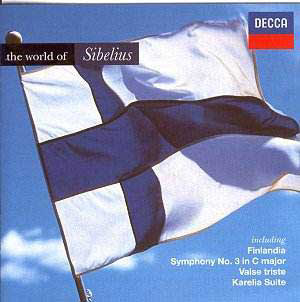Vladimir Ashkenazy's Sibelius recordings for Decca,
made during the 1980s and early 1990s, added a valuable series of performances
to the catalogue. They form the backbone of this 'World of Sibelius'
issue.
The chosen repertoire is compelling enough, not always
the obvious music but always strongly characterised and well performed
and recorded. The Third Symphony, for example, is much less frequently
performed than either of the first two; yet to the enthusiastic and
informed Sibelian it is surely more truly representative of the composerís
genius. Be that as it may, Ashkenazy's beautifully judged and dramatic
rendition is more than welcome here. There is no lack of momentum, a
particular issue in this among all the symphonies, while there are moments
of rare poetry too.
Birgit Nilsson, one of the great singers of the 20th
century, gives committed and compelling performances of these two songs,
ably accompanied. Although the Viennese musicians must have had little
experience of performing Sibelius, they do so with the utmost professionalism,
and the results are idiomatic. The orchestra may be relatively in the
background in an acoustic which favours Nilsson's richly expansive tones,
but the subtleties and atmosphere still make their point.
The remaining times are shorter works by the master,
and very popular they heave become. The Finlandia performance
has a sweeping energy as its greater strength, although in the later
stages there might have been a little more nobility as represented by
breadth and sweep. The Karelia Suite is beautifully done: atmospheric
as and when required, there is also a degree of tenderness in the slower
central movement. Yet this very phenomenon seems under-utilised in the
famous Valse Triste, in which an even slower tempo (try Karajan
on DGG) brings extra dividends.
Inevitably a compilation such as this is likely to
be a mixed bag. But these artists are all distinguished enough to have
acquired reputations as performers of Sibelius, and these performances
do indicate why this is indeed the case.
Terry Barfoot


